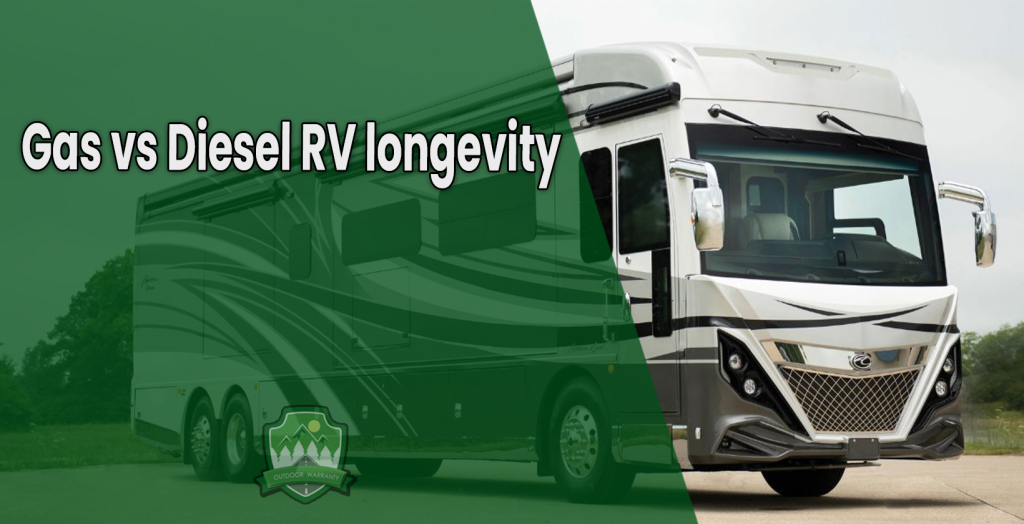
Table of Contents
The gas vs. diesel RV (Recreational Vehicle) comparison depends on factors, such as engine longevity, fuel efficiency, torque, towing capacity, initial cost, and maintenance. Diesel engines last longer due to their robust construction, reaching 500,000 miles with proper maintenance, while gas engines last around 200,000 miles. RV gas or diesel choices differ regarding fuel type and availability. Diesel is more fuel-efficient, for long trips, but gasoline is available and cheaper.
Diesel engines provide more torque and smoother rides regarding performance and driving experience, making them ideal for towing and steep climbs. Gas engines offer quicker acceleration but are less suited for heavy-duty tasks. Diesel RVs have a higher initial price but offer longer-lasting engines, which save money in the long run. Maintenance for diesel engines is more expensive, but their extended service intervals balance this cost.
Fuel efficiency and emissions are factors in the decision. Diesel engines are more fuel-efficient on longer journeys, while gas engines produce fewer harmful emissions. The decision between diesel engine vs gas engine depends on travel style, budget, and the importance of engine longevity, fuel efficiency, and initial cost.
Do RVs take Diesel Fuel?
Yes, some Recreational Vehicles (RVs) use diesel fuel, while others use gasoline. Diesel engines are common in larger, high-end motorhomes, such as specific Class A and Class C models. These RVs are designed for long-distance travel and heavy-duty use. Diesel engines provide better fuel efficiency for larger vehicles. Gasoline-powered Recreational Vehicles are smaller and more affordable. Class B and smaller Class C RVs run on gasoline. Diesel-powered RVs offer increased towing capacity. Diesel engines tend to last longer and have more torque.
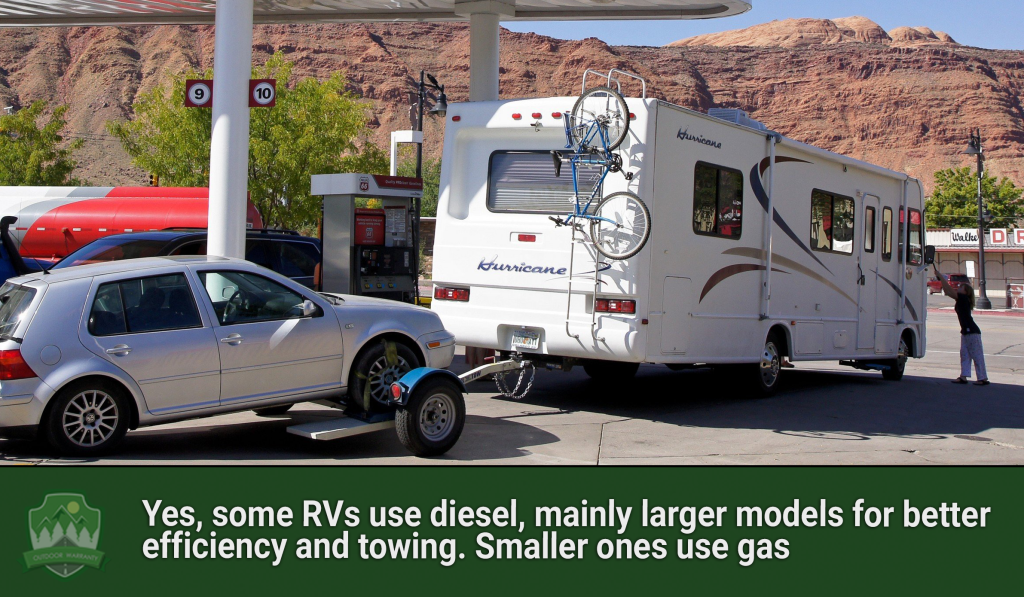
Why Choose Diesel vs Gas Motorhome?
Choose diesel vs gas motorhome because diesel engines offer more power and better fuel efficiency in larger vehicles like the Class A Motorhome. Diesel engines last longer, making them more suitable for long-term use. They provide greater towing capacity and torque, which enhances the driving experience when hauling large loads. Gas motorhomes are more affordable upfront but tend to have lower fuel efficiency. Diesel Class A motorhomes require more maintenance but have higher resale value due to their durability. Gas motorhomes are easier to maintain and are less expensive to repair.
What are the Advantages of a Diesel RV?
The Advantages of a Diesel RV are listed below.
- Higher Torque: Diesel engines produce more torque, providing better power for towing heavy loads and climbing steep inclines.
- Better Fuel Efficiency: Diesel engines are more fuel-efficient, allowing longer trips with fewer stops for refueling.
- Longer Lifespan: Diesel engines last longer than gasoline engines, offering more durability.
- Smoother Rides: Diesel engines offer smoother rides in larger Class A Motorhomes, due to their power and efficiency.
- Higher Towing Capacity: Diesel RVs tow heavier loads, making them ideal for hauling additional vehicles or trailers.
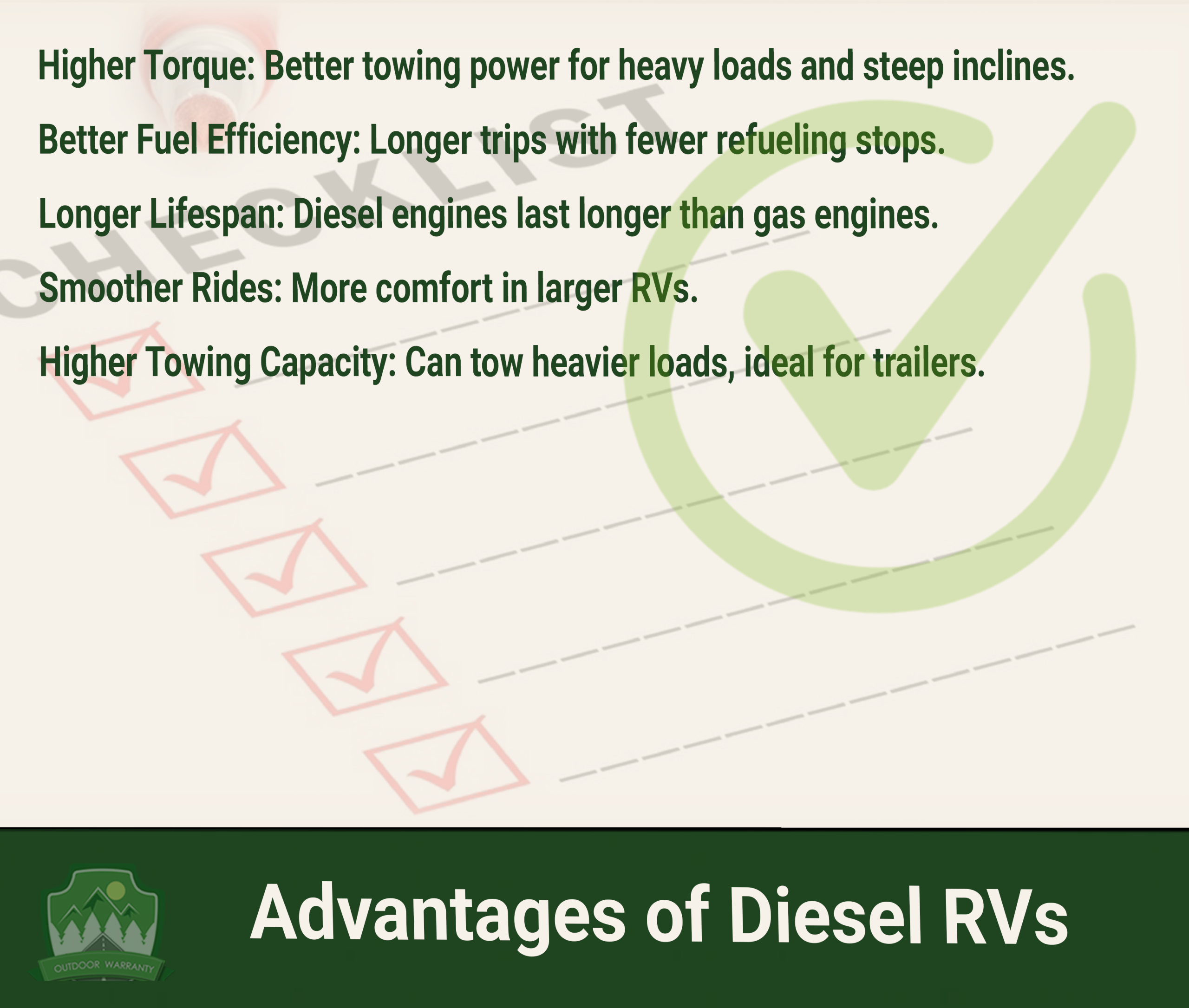
What are the Disadvantages of a Diesel RV?
The Disadvantages of a Diesel RV are listed below.
- Higher Upfront Costs: Diesel RVs cost more than gasoline models, increasing initial investment.
- More Expensive Maintenance: Diesel engines require more specialized care, resulting in higher maintenance and repair costs.
- Pricier Fuel: Diesel fuel is more expensive than gasoline, raising operational costs over time.
- Limited Availability of Diesel Repair Shops: Finding a diesel repair shop is difficult, leading to potential delays in maintenance or repairs.
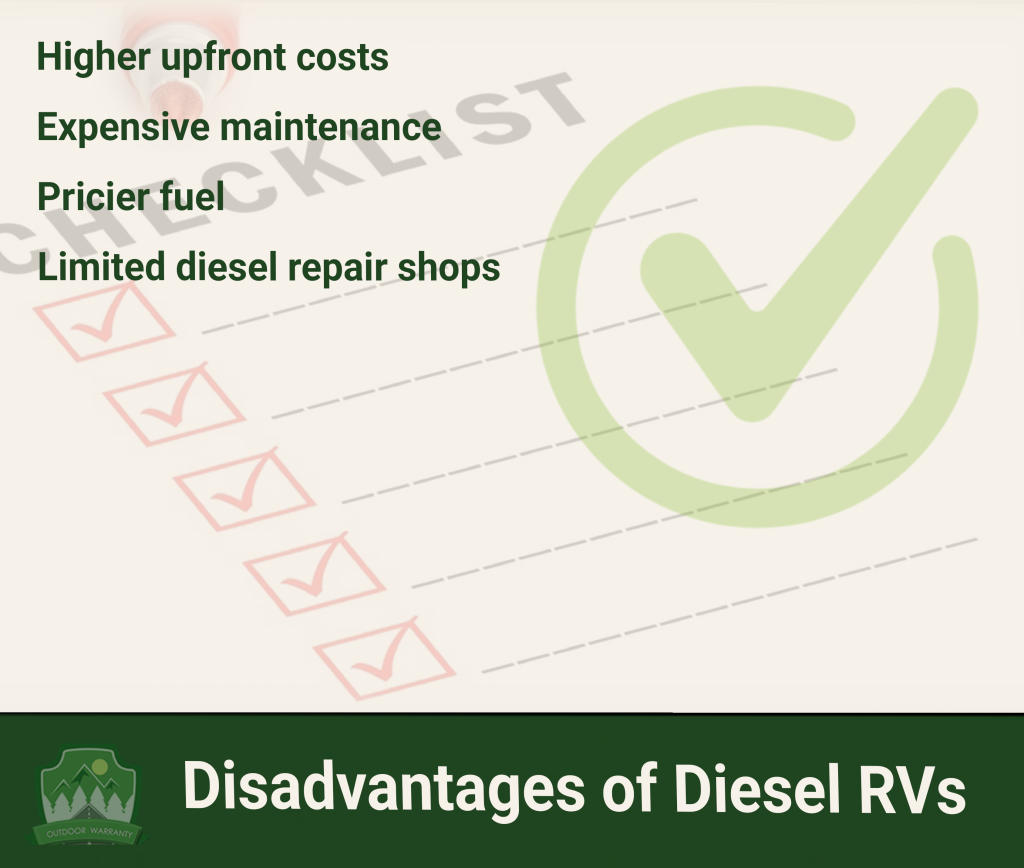
Why are Diesel RVs More Expensive?
Diesel RVs are more expensive because diesel engines are built for durability and longevity and are designed to withstand the demands of long-distance travel and heavy usage. These engines include advanced components such as air brakes and heavy-duty transmissions, contributing to higher costs. Diesel RVs feature premium interiors, offering enhanced comfort and luxury. Combining these high-quality materials and components leads to a higher price tag.
How Long will a Diesel RV Last?
A diesel RV lasts on average up to 500,000 miles with proper maintenance. Diesel engines are built for durability, allowing them to endure long-distance travel and heavy use. A diesel engine outlasts a gasoline engine, which lasts around 200,000 miles with regular upkeep. The extended lifespan of a diesel RV makes it a solid investment for long-term travel and heavy-duty use.
Can you Buy a Diesel Class C RV?
Yes, you can buy a diesel class C RV. Diesel class C RVs are built on Mercedes Sprinter or Ford chassis, offering enhanced performance and efficiency. It provides better fuel efficiency and higher towing capacity than gasoline models. Popular diesel Class C models include the Winnebago View and the Coachmen Prism. These models are known for their smooth driving experience, durability, and fuel efficiency, making them ideal for long trips and heavy-duty use.
Why Choose Gas vs Diesel RV?
Choose a gas vs diesel RV because it offers a lower initial cost, making them more affordable for buyers on a budget. Gas engines are easier to maintain and repair, with more nationwide service centers. Fuel for gas RVs is more available, ensuring fewer concerns when refueling during trips. Gas RVs are ideal for occasional or shorter trips, where a diesel RV’s higher fuel efficiency and towing capacity are unnecessary. Gas models are a practical choice for buyers with budget constraints or less frequent travel plans.
Why are most RVs using Gas Engines?
Most RVs are using gas engines because they are more affordable and have lower maintenance costs. Gas engines are less expensive than diesel engines, making them a more budget-friendly option for many RV buyers. Gas engines are simpler in design, which results in lower repair and maintenance costs. The widespread availability of gasoline makes it easier to find fuel in remote areas, which adds to the convenience of using a gas-powered RV.
Smaller RVs, such as Class B and C models, use gasoline conveniently and cost-effectively. These RVs are used for shorter or occasional trips, where a diesel engine’s higher fuel efficiency and towing capacity are unnecessary. Gas engines provide enough power for these RVs while offering lower upfront costs and easier maintenance. It makes gas-powered RVs a practical choice for many travelers.
What kind of Gas does an RV take?
The kind of gas an RV takes is regular unleaded gasoline (87 octane). Gas-powered RVs use the standard fuel, which is readily available and affordable. It is the most common type of gasoline used in RVs for models that are smaller or designed for occasional use.
High-performance RVs require premium fuel, but it is rare. Premium fuel is used in vehicles with more powerful engines or RVs designed for higher performance, but most RVs do not require it. Regular unleaded gasoline is sufficient for everyday use and long trips for most RV owners.
What are the Advantages of Gas RVs?
The Advantages of Gas RVs are listed below.
- Lower Initial Cost: Gas RVs are less expensive than diesel models, making them more accessible for many buyers.
- Easier Maintenance: Gas engines are simpler and less expensive, with more service centers available for repairs.
- Widespread Fuel Availability: Gasoline is more readily available, ensuring convenience when refueling during trips.
- Lower Operating Costs: Gas RVs have lower operating costs due to the gasoline’s affordability and the engine’s simplicity.
- Ideal for Occasional Use: Gas RVs are a practical choice for buyers who use them for shorter trips or occasional travel.
- Smoother Rides: Gas engines offer a smoother driving experience in smaller RV models, due to their balance of power and efficiency.
- Lower Resale Value: Gas RVs maintain reasonable resale value, although not as high as diesel RVs, making them a good investment for short-term use.
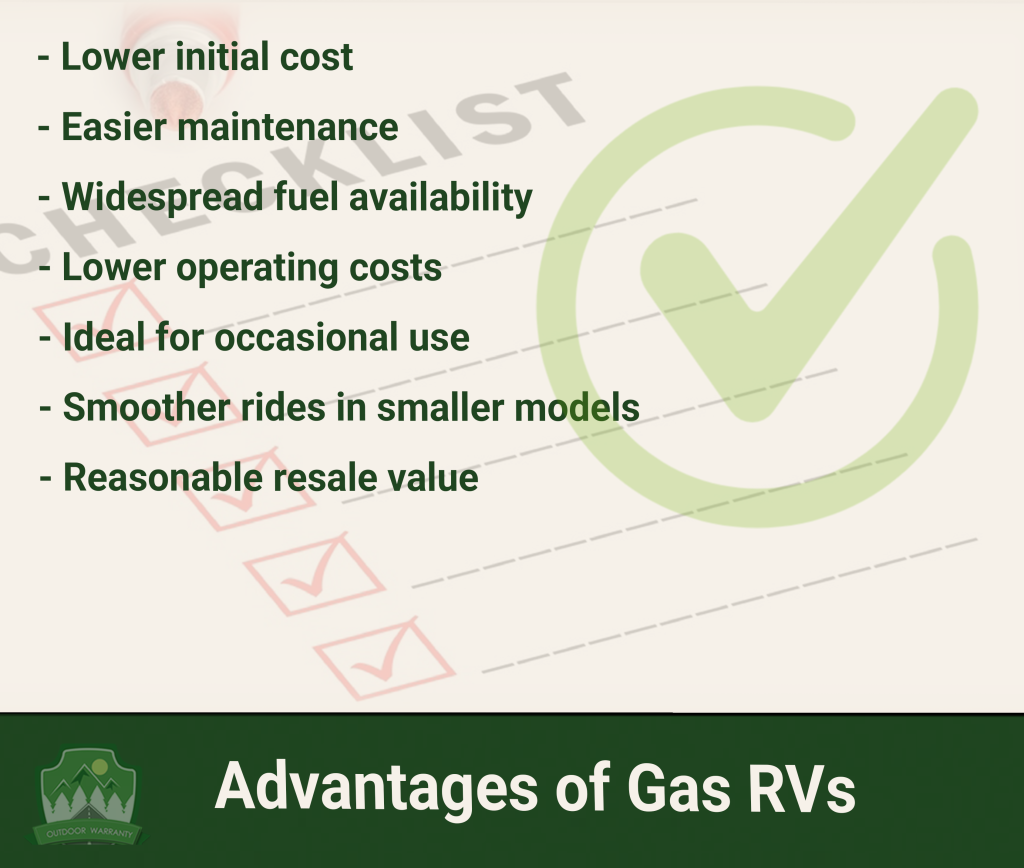
What are the Disadvantages of Gas RVs?
The Disadvantages of Gas RVs are listed below.
- Lower Fuel Efficiency: Gas RVs have lower fuel efficiency than diesel models, requiring more frequent refueling on long trips.
- Shorter Lifespan: Gas engines tend to have a shorter lifespan than diesel engines, reducing the longevity of the RV.
- Less Towing Capacity: Gas RVs have less towing capacity than diesel models, limiting their ability to haul heavy loads.
- Higher Operating Costs: Gas RVs increase operational costs on extended journeys due to lower fuel efficiency.
- Higher Maintenance Costs for Larger Models: Larger models incur higher maintenance costs than diesel models, while smaller gas RVs are easier to maintain.
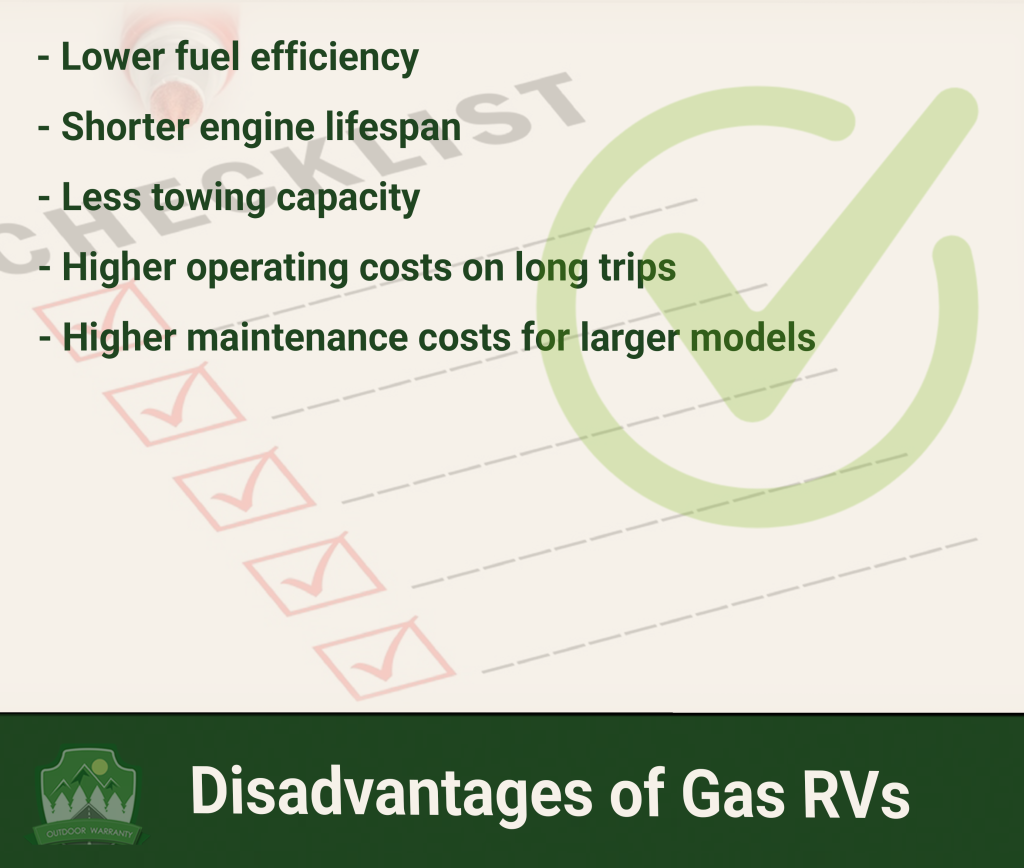
What is the Best Gas Mileage RV Class C can Give?
The best gas mileage a Class C RV can give is between 8 and 15 MPG, depending on size and weight. Factors affecting the class C RV gas mileage include speed, load, aerodynamics, and driving conditions. Heavier loads or higher speeds reduce fuel efficiency, while favorable driving conditions and lighter loads improve mileage. A Class C RV with more efficient designs achieves a higher end in the range.
What are the Key Differences Between Gas and Diesel RVs?
The key differences between gas and diesel RVs are fuel efficiency, engine longevity, cost, maintenance, and driving experience. Diesel RVs offer better fuel efficiency for long trips, and have a longer engine lifespan than gas models. Diesel engines are more expensive upfront but provide more power and higher towing capacity. Gas RVs are more affordable, with lower maintenance costs and easier service. Diesel RVs offer a smoother driving experience in larger Class A Motorhomes. Gas RVs are suitable for short or occasional trips, while diesel RVs are ideal for full-time RVing and long-distance travel.
How do Gas and Diesel Engines Impact RV Performance?
Gas and diesel engines impact RV performance by offering different strengths in power and efficiency. Diesel engines are known for their higher torque, which is beneficial when towing heavy loads or navigating steep inclines. The additional power allows diesel-powered RVs to maintain speed and stability when hauling large trailers or driving through mountainous terrain. Gas engines provide quicker acceleration, making them ideal for shorter trips and faster starts, but they offer lower torque than diesel engines.
Fuel efficiency is another area where gas and diesel engines differ significantly. Diesel engines are more fuel-efficient on long trips and are favored for full-time RVing and long-distance travel. Diesel engines consume less fuel per mile, making them more economical over extended distances. Gas engines consume more fuel on long journeys, which increases operational costs. The difference in fuel efficiency plays a crucial role in determining the cost-effectiveness of each engine type depending on travel style and frequency.
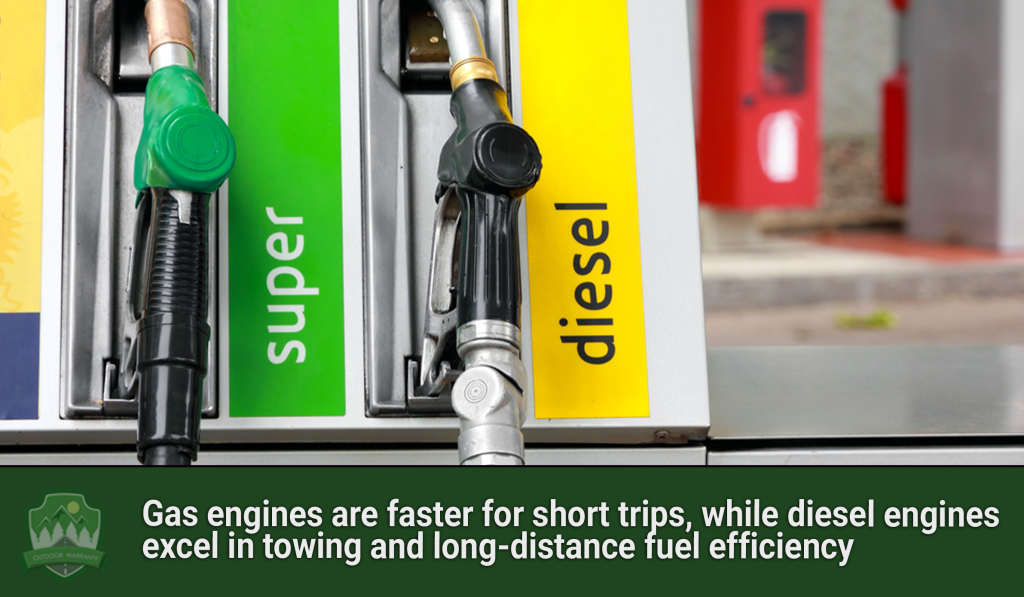
How do Maintenance Costs Compare Between Gas and Diesel RVs?
The maintenance costs between gas and diesel RVs compare by being higher for diesel models but with longer service intervals. Diesel engines are more complex, resulting in higher repair costs, though they need less frequent maintenance. Gas engines are more affordable to repair and widely serviced but require frequent upkeep. The difference affects maintenance for RVs over time.
Are Diesel RVs Better for Handling Steep Inclines and Mountain Roads?
Yes, diesel RVs are better for handling steep inclines and mountain roads. Diesel engines perform better due to their higher torque, which provides more power for climbing steep grades. They offer superior engine braking, helping to maintain control on downhill descents. Gas RVs struggle with heavy loads on mountains, as their lower torque makes it harder to maintain speed and power on steep inclines.
How do Emissions Compare Between Gas and Diesel RV Engines?
Emissions between gas and diesel RV engines are compared by how they handle pollutants. Modern diesel engines have advanced significantly in terms of emissions control. They use DEF (Diesel Exhaust Fluid) and various emission control systems, such as selective catalytic reduction (SCR), to reduce harmful pollutants like nitrogen oxides (NOx) and particulate matter. These systems significantly lower the environmental impact of diesel engines, making them more environmentally friendly than older diesel engines.
Gas engines produce fewer nitrogen oxides (NOx) and particulate matter than diesel engines, making them cleaner in terms of local air quality. However, gas engines emit more carbon dioxide (CO2) over time due to lower fuel efficiency. Their higher fuel consumption leads to a greater carbon footprint on longer trips, while they are cleaner in some respects. The choice between gas and diesel engines depends on the balance between these emissions and the specific environmental concerns of the user.
Are Gas RVs more Environmental Friendly?
Yes, gas RVs are more environmentally friendly. Gas RVs produce fewer nitrogen oxides (NOx) and particulate matter, which are harmful pollutants. However, diesel RVs have better fuel efficiency, which reduces overall CO2 emissions over long distances. The overall RV Eco-Friendliness depends on balancing local emissions and long-term fuel efficiency.